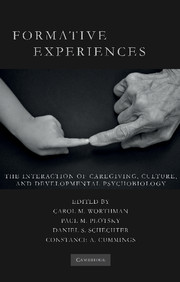Book contents
- Frontmatter
- Contents
- List of Figures
- List of Tables
- List of Contributors
- Foreword by Robert Sapolsky
- Preface
- List of Abbreviations
- Introduction
- SECTION ONE HISTORICAL, CROSS-CULTURAL, AND DEVELOPMENTAL SCIENCE PERSPECTIVES
- SECTION TWO HOW EXPERIENCE INTERACTS WITH BIOLOGICAL DEVELOPMENT
- SECTION THREE FORMATIVE RELATIONSHIPS WITHIN AND ACROSS GENERATIONS
- SECTION FOUR SOCIAL AND CULTURAL CONTEXTS OF CHILDHOOD DEVELOPMENT – NORMATIVE SETTINGS, PRACTICES, AND CONSEQUENCES
- SECTION FIVE FEAR, FUN, AND THE BOUNDARIES OF SOCIAL EXPERIENCE
- SECTION SIX PUBLIC HEALTH, EDUCATION, AND POLICY IMPLICATIONS
- Index
Introduction
Published online by Cambridge University Press: 26 May 2010
- Frontmatter
- Contents
- List of Figures
- List of Tables
- List of Contributors
- Foreword by Robert Sapolsky
- Preface
- List of Abbreviations
- Introduction
- SECTION ONE HISTORICAL, CROSS-CULTURAL, AND DEVELOPMENTAL SCIENCE PERSPECTIVES
- SECTION TWO HOW EXPERIENCE INTERACTS WITH BIOLOGICAL DEVELOPMENT
- SECTION THREE FORMATIVE RELATIONSHIPS WITHIN AND ACROSS GENERATIONS
- SECTION FOUR SOCIAL AND CULTURAL CONTEXTS OF CHILDHOOD DEVELOPMENT – NORMATIVE SETTINGS, PRACTICES, AND CONSEQUENCES
- SECTION FIVE FEAR, FUN, AND THE BOUNDARIES OF SOCIAL EXPERIENCE
- SECTION SIX PUBLIC HEALTH, EDUCATION, AND POLICY IMPLICATIONS
- Index
Summary
Anyone who cares for the interests of the young faces a vexing paradox: Dramatically escalating challenges threaten their future even as our knowledge about human development exponentially expands. Global trends including rapid societal changes in family formation, schooling and paid labor participation, escalating refugeeism and migration, and rising rates of AIDS- or conflict-related orphanhood have transformed early rearing environments. Concurrently, advances in the developmental sciences have identified critical elements and mechanisms involved in social and emotional development in humans. Recent molecular research on epigenetics, for instance, not only documents gene-environment interactions that play crucial roles in this process, but also illuminates the significance of the particular context in which a person's early experience unfolds. Both clinical and animal research play leading roles in these advances, by respectively providing in-depth clinical pictures of how development goes awry or is mended, and comparative or experimental material about how the process works. Reciprocally, anthropological studies probe the range of cultural practices, meanings, and ecologies that shape both contexts and experiences.
These key intellectual insights have transformed how we think about development, about culture, and about biology in ways also relevant to policy, prevention, and treatment. Essentially, we have learned that human nature is innately nurtured: Without the social world and its animating culture, we cannot become human. Although how we depend on nurturance is peculiar to humans, such reliance turns out to be widespread among animals.
Information
- Type
- Chapter
- Information
- Formative ExperiencesThe Interaction of Caregiving, Culture, and Developmental Psychobiology, pp. 1 - 8Publisher: Cambridge University PressPrint publication year: 2010
